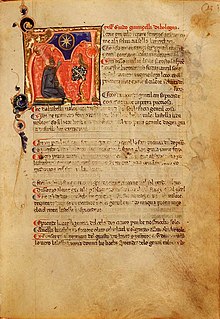Guido Guinizelli
Guido Guinizelli (* around 1230 in Bologna , † around 1276 in Monselice , near Padua ) was an Italian poet and founder of the literary movement Dolce stil novo .
biography
The son of a judge, he followed his father's career path and, after studying law in Bologna , became a lawyer and at the same time participated in the political life of his city, which was divided by the two political parties, the Guelphs and the Ghibellines . In 1270 he became Podestà of Castelfranco Emilia , but when the Guelfi party won in 1274, the Ghibelline Guinizelli had to go into exile and found refuge in Monselice with his wife and son. He died there a few years later.
Act
Guinizelli is considered one of the greatest poets of his time. His rime (rhymes) are the basis of the movement that Dante Alighieri later called Dolce stil novo ( it. 'Sweet new style'), as he communicates in the 24th song of the Purgatory of his Divine Comedy through the words of the poet Bonagiunta Orbicciani , who presents his poetic principles after Dante has given him his own principles. Dante names the features that distinguish the approach of the love poems of the Sicilian school of poets , whose follower was Guittone d'Arezzo , from that of the sweet new style .
In the song Al cor gentil rempaira semper amore (“rempaira” is a Provencal word for “to return home”), Guinizelli emphasized the relationship between love and the noble spirit ( nobiltà d'animo ). The song is a "manifesto" of the new movement that wanted to overcome courtly and Provencal poetry, of which only distant references remained in the lyric. Guinizelli sang a love that represents a principle of moral ascent, a love that consists of individual virtue and noble spirit in the natural world order of the creature and defined the canzone of the new school of poetry.
«Al cor gentil rempaira semper amore
come l'ausello in selva a la verdura;
né fe 'amor anti che gentil core,
né gentil core anti ch'amor, natura »
In what was then central and northern Italy , the bourgeois Comuni flourished , in whose society the concept of nobility became more of a spiritual virtue than a hereditary characteristic and the close relationship between the noble spirit and the ability to love developed. A typical feature of the new literary movement, whose pioneer was Guinizelli, is the donna angelo (angel-woman), the image of the woman as an angel sent by God who was able to cleanse the lover's spirit and turn him from sin into a heavenly one To lead bliss. These terms were deepened in both a philosophical and a psychological sense, which reflected with great accuracy the effects of love on the spirit of the person in love.
Guinizelli's lyrical and ideological model inspired a group of poets ( Fedeli d'Amore ) in Florence , the greatest representatives of which were Guido Cavalcanti and Dante Alighieri , who in their youth in some rhymes, and especially in Vita nova , the psychological Analysis of love deepened and affirmed the topic of women as a saving virtuous creature. The Dolce stil novo was in the Canzoniere of Petrarch referred to, which was the dominant model of Italian and European poetry at least until the 17th century.
literature
- Paolo Borsa: La nuova poesia di Guido Guinizelli . Cadmo, Firenze 2007, ISBN 8879233637 .
- GR Ceriello: I rimatori del Dolce style novo. Guido Guinizelli, Guido Cavalcanti, Lapo Gianni, Gianni Alfani, Dino Frescobaldi, Cino da Pistoia . Biblioteca Universale Rizzoli, 2003.
- Giorgio Inglese: GUIDO Guinizzelli (Guinizelli). In: Mario Caravale (ed.): Dizionario Biografico degli Italiani (DBI). Volume 61: Guglielmo Gonzaga-Jacobini. Istituto della Enciclopedia Italiana, Rome 2003.
- Pietro Pelosi: Guido Guinizelli: stilnovo inquieto . Liguori, Napoli 2000, ISBN 882073026X .
Web links
- Literature by and about Guido Guinizelli in the catalog of the German National Library
- Guido Guinizelli . Classical and Medieval Literature Criticism. eNotes.
| personal data | |
|---|---|
| SURNAME | Guinizelli, Guido |
| ALTERNATIVE NAMES | Guinizzelli, Guido |
| BRIEF DESCRIPTION | Italian poet and politician |
| DATE OF BIRTH | around 1230 |
| PLACE OF BIRTH | Bologna , Italy |
| DATE OF DEATH | around 1276 |
| Place of death | Monselice , Italy |
